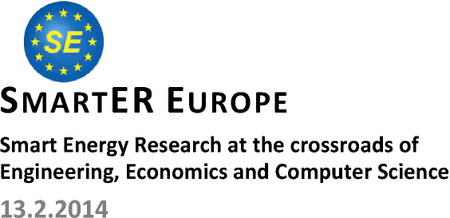SmartER Europe 2014
Call for Papers

The transformation process of European energy supply faces a number of severe challenges. Beside societal and political demands, technical, economical and organizational aspects have to be addressed. Many proposals on specific topics exist but comprehensive smart solutions for a sustainable future energy system are still missing. Especially, the complex and manifold interdependencies between involved technologies, many and cross-national varying regulations and convincing business cases require particular attention. And both long-term visions and concepts with perceptible benefits in the short- to medium-term are needed.
New solutions have to contribute to maintaining or even increasing the reliability and the security of energy supply in more decentralized systems. Additionally, newly designed energy markets should enable an efficient and transparent matching of supply and demand for energy and ancillary services in large-scale networks. This requires the analysis and handling of much more data and advanced algorithms for forecasting, operation and matching. The resulting overall system is thus going to be significantly more complex and interlinked. Decentralized and autonomous agents may enable here robust high-performance system operation. Yet the interactions between the market level and the technical system operation have to be considered carefully.
Although significant efforts and investments have already been put into the development of Smart Grids and Smart Markets, significant research questions need to be answered before Smart Grids will become reality. This, especially, also includes hybrid energy infrastructures where not only electricity is considered but also other grid-based energy carriers like natural gas and heat. Additional flexibility but also additional complexity is gained when these networks interact in order to meet the demands of a decentralized, diversified, secure and stable future energy supply.
Regardless of whether and how the energy supply will be designed and operated in the future it is obvious that a key enabler for a successful transformation of the energy supply will be a purposefully designed and used ICT infrastructure. New solutions will consolidate and represent the combined knowledge and experience of different disciplines as engineering, business management and economics and computer science and, thus, contribute significantly to an efficient energy supply and to the success of involved companies. The IT backbone for such solutions are likely to be distributed, collaborative, autonomous and intelligent software packages for simulation, monitoring, control and optimization as well as appropriate data and business models, reporting systems and maybe also mobile solutions.
Topics
The SMARTER-EUROPE Conference aims at providing an interdisciplinary forum for presenting and discussing recent advances and experiences in building and using new IT-based solutions for Smart Grids and Smart Markets. For this, the conference provides a forum for different scientific disciplines. Furthermore, it will enable an industrially relevant exchange of knowledge and experience. In particular, it includes (but is not limited to) the following areas and topics of interest:
Smart Grid, Smart Home and Network Automation
• Decentralized control systems
• Stability in Energy Grids
• Distributed Optimization in Energy Networks
• Multi-Agent Systems and Multi-Agent based simulations
• Self-aware, self-configuring or self-healing energy systems
• Simulation of Smart Grids
• Approaches for Hybrid Energy Networks (Interactions and exchange between networks for electricity, gas, heat and other)
• Assistance Systems for Smart Energy control
Smart Data Handling
• Alternative Data Storing and Proceeding Technologies
• Big Data
• Software Tools for Smart Energy Networks
• Data Security
• Data Structures and required Standards
• Mobile Solutions
Smart Markets, Trading and Business models
• Forecasts / Predictions
• Management of distributed generation and storage
• Distributed planning processes for energy networks
• Products and User Interfaces
• Business Models
• Competition analysis
• Process Management
• Electric Mobility
• Solar Home Storage Systems
